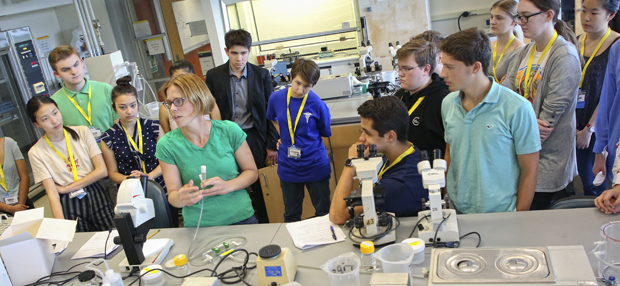Future leaders in health and medicine flock to Brandeis
The Global Youth Summit on the Future of Medicine provides motivated teenagers with a platform to engage with the continuously evolving medical field
 Photo/Mike Lovett
Photo/Mike LovettStudents from the Global Youth Summit on the Future of Medicine learn from biology professor Melissa Kosinski-Collins in a lab session.
During the program, students attend lectures, work in labs and participate in workshops that offer insights into the future of the healthcare industry, and hone leadership, networking, public speaking and collaboration skills.
“I like how we get so much professional experience in a short amount of time, how you can learn a lot and have fun,” said Libby Jin of Newton, Massachusetts. “Hopefully, through this program, I can learn more and get more involved in the medical field in my community and build up my experience for college and medical school. Having talks with these great professionals has been an awesome experience.”
Dr. Andrew Kolodny, a senior scientist and the director of the Opioid Policy Research Collaborative at Brandeis, served as the keynote speaker for the Global Youth Summit; Kolodny’s remarks inspired many students to think differently about the role of medicine in overcoming public health challenges.
“I’ve always had an interest in medicine but knew coming in that I needed to broaden my horizons in this field,” said Spencer McCorkle of northeast Arkansas. “I hope to incorporate more treatments without a pill...I want to get to the source and fixing a problem without having to use anything like that.”
Students also had the opportunity to enter the lab and look under the microscope. Under the guidance of biology professor Melissa Kosinski-Collins, Global Youth Summit participants studied Huntington’s disease by experimenting on fruit flies.
In Kosinski-Collins’ biology lab in the Shapiro Science Center, students started by putting the flies to sleep using carbon dioxide. They eventually dissected the unconscious flies and examined them under a microscope.
“I would like to pursue data science, but I’ve always found medicine to be interesting and unique in general,” said Chicago native Nathaniel Smith. “When we dissected the fruit flies, we did so to learn about different neurological diseases.”
“The experience was immersive,” Smith added. “Knowing more about medicine can help me look at problems in data science in more well-rounded way.”
The Global Youth Summit on the Future of Medicine is administered through the Office of Precollege Programs at Brandeis.
Categories: Science and Technology





